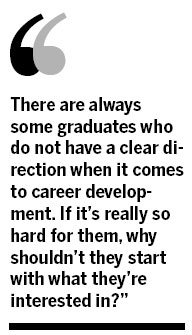Voices
Don't be scared to turn a hobby into a business
By Huang Yuli (China Daily)
Updated: 2010-04-27 08:08
 |
Large Medium Small |
My friend Felix, an electronics engineer, is fanatical about action figures. Scale models of soldiers and tanks and movie figures always demand his full attention. However, as he soon discovered, it is a very expensive hobby, and as the crowd of figures in his apartment grew the money he had available to spend on his hobby shrank.
In order to reverse this state of affairs he opened an online shop three years ago selling secondary figures; the business did quite well and had the added advantage that he was able to purchase products from the wholesalers at a lower price. After two years his business network even reached the manufactures.

He transformed a simple hobby into a successful business with good profit. However, the phone calls and e-mails he had to deal with grew vigorously and paper boxes of toys gradually occupied his apartment. It reached a point where he found that his little hobby kept him constantly working. "Never turn your hobby into a profession", he said.
However, it was not until one of my favorite writers said the same thing in a television interview that I began to ponder the issue.
Is it true? Will you kill your enjoyment if you turn your hobby into a profession?
I couldn't help but wonder: Why do so many people avoid making their hobbies their work?
Some people say a hobby is something you develop outside work, and while I don't dispute the idea, I think the truth is, that for people in the metropolis who work eight hours a day and spend an average of two hours a day traveling to and from work, their hobby quickly becomes a luxury as their age and position grow and the space for hobbies gets squeezed out by the demands of work and family.
But for those who continue to pursue their hobby despite the pressures of daily life, perhaps the reason they don't make it their profession is fear: they are just too scared of taking on responsibilities, of being put under pressure, and most of all, they're afraid that once a hobby becomes a profession, the mysterious allure will then disappear, and it will be just like any other profession. It must feel like your dream has died.
Even so, I still question the conclusion drawn by some that because if it's not right to turn your hobby, which is your major interest, into a career, then isn't it even more pathetic to pursue a profession you're not interested in?
There are always some graduates who do not have a clear direction when it comes to career development. If it's really so hard for them, why shouldn't they start with what they're interested in? Doesn't it make more sense to try and make their hobby their career, rather than plunging into the traffic without knowing their destination?
Last week I ran into Felix again, it's been six months since we last met. He looked glamorous. He told me cheerily that a well-know action figure manufacturer offered him a job as creative director for one of his sub-brands, and he had accepted it.
"Aren't you afraid of turning hobby into a profession?" I teased him.
"At least I am doing something I'm interested in, life is short anyway," he said.







